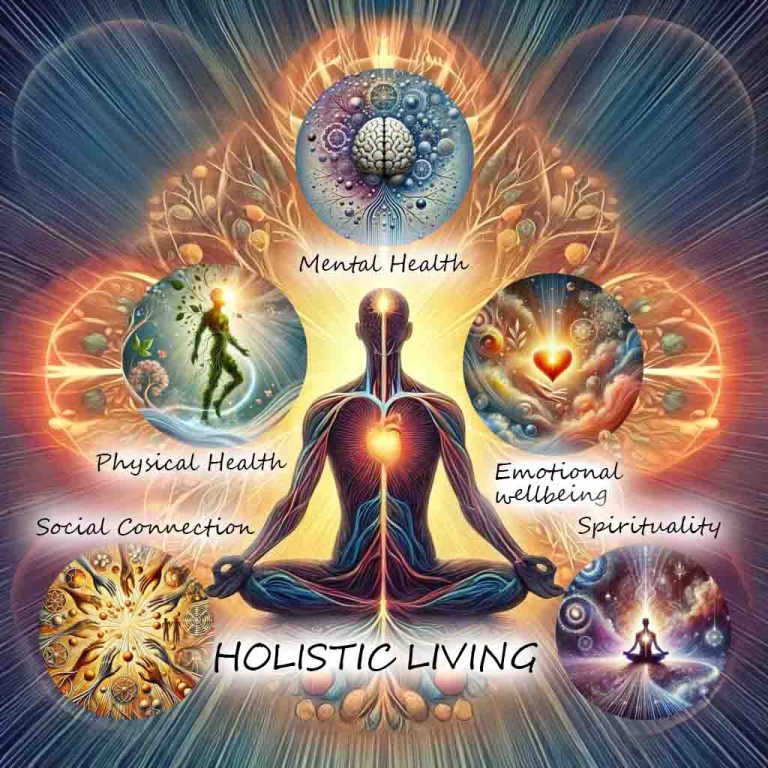The Benefits of Meditation for Mental Health: Mindfulness & Well-Being
The benefits of meditation for mental health are extensive, including reduced stress, improved emotional well-being, enhanced self-awareness, and a greater ability to manage symptoms of conditions such as anxiety and depression. By practicing meditation, individuals can cultivate a sense of calm and inner peace while promoting overall mental wellness.
Feeling overwhelmed by a hectic schedule is a familiar experience. Many find themselves grappling with anxiety and stress, struggling to maintain focus at work, feeling irritable, and experiencing sleepless nights. This constant battle can make daily life feel like an uphill task.
However, there’s hope through meditation—an ancient practice increasingly supported by modern science. Studies show that regular meditation can significantly reduce symptoms of anxiety and enhance emotional well-being. By dedicating time to gather extensive research and numerous testimonials, we aim to present you with a holistic view of how meditation could be your key to a more balanced life. Let’s explore these unexpected benefits scientifically proven to improve mental health.

The Numerous Benefits of Meditation For Mental Health
Meditation functions as a quiet superpower, silently yet effectively improving our mental and physical health. One of its most compelling aspects is its ability to reduce symptoms of anxiety and depression. Scientific studies have shown that regular meditation can lead to a 20-30% reduction in these symptoms. By dedicating a small part of your daily routine to meditation, you could experience significant improvement in emotional well-being.
But the benefits don’t stop there. Meditation has also been found to lower blood pressure. In today’s fast-paced world, high blood pressure is a common issue, leading to various health complications if left unchecked. The calming effect of meditation on the nervous system can aid in regulating blood pressure, contributing to the overall well-being of the body.
In addition to mental and physical aspects, meditation has also been linked to improved sleep quality. Research has indicated that incorporating meditation into one’s routine can positively impact sleep patterns, promoting better rest and rejuvenation.
The profound impact of meditation on immune function further underscores its holistic benefits. A strengthened immune system is crucial for protecting the body from illnesses and infections. When we incorporate meditation into our lives, it serves as a form of self-care that fortifies our overall health.
It’s clear that introducing a daily meditation practice can offer a comprehensive approach to maintaining both mental and physical well-being. From reducing symptoms of anxiety and depression to enhancing sleep quality and bolstering immune function, the benefits of meditation are far-reaching and impactful.
As we’ve seen, the multifaceted advantages of meditation extend beyond just mental health. Now, let’s explore how meditation serves as a powerful tool in reducing stress levels.
Reducing Stress through Meditation
Stress is something that almost everyone has experienced at some point. It can feel like we don’t have enough time or like we’re juggling too many things at once, impacting both mental and physical health. That’s where meditation steps in. By practicing regular meditation, you can learn to manage stress more effectively.
The Role of Cortisol Reduction
Meditation has been shown to lower the levels of a hormone called cortisol, which is directly linked to stress. When stressed, our bodies produce more cortisol, and over time, high levels of cortisol can lead to negative health effects. Research from the National Center for Biotechnology Information (NCBI) found that participants who meditated daily for eight weeks experienced a 25% reduction in cortisol levels, demonstrating meditation’s tangible impact on the body’s stress response.
When you meditate regularly, you give your body and mind a chance to deeply relax—a response that counteracts the effects of stress by lowering cortisol levels. It’s akin to giving your mind and body a break from the constant “fight or flight” mode induced by stress.
Techniques for Immediate and Long-Term Benefits
Meditation offers various techniques to reduce stress. Simple practices such as focused breathing or guided imagery can provide immediate relief from feelings of stress and anxiety. These techniques offer pause from the chaos of our thoughts and surroundings, allowing us to reset and find calm within ourselves. Over time, regular meditation strengthens resilience against stress triggers; just like physical exercise strengthens our muscles, the practice of meditation builds our mental and emotional resilience.
Incorporating these techniques into your daily life takes time and patience—the goal isn’t just to manage stress when it arises but to cultivate an overall sense of peace and well-being. As with any skill, consistency is key in reaping the long-term benefits of reduced stress through meditation.
With these insights in mind, it is clear that meditation not only provides immediate relief from stress but also works on a deeper level to build resilience against its effects over time.
Enhancing Emotional Well-Being

Emotional regulation is the ability to effectively manage and respond to an emotional experience. It impacts our relationships, decision-making, and overall mental health. Meditation empowers us to develop greater emotional balance by reinforcing our capacity to process emotions without feeling overwhelmed. When we meditate, we activate brain regions associated with positive emotions while simultaneously deactivating those linked to negative emotions, creating a harmonious equilibrium, allowing us to navigate our feelings more adeptly.
Imagine it as a mental workout specifically designed to fortify your emotional muscles. Just like physical exercises strengthen your body, meditation promotes mental resilience by training the mind to handle emotional challenges with grace. It’s not about eliminating negative emotions but rather about learning to acknowledge and manage them effectively.
For instance, loving-kindness meditation focuses on nurturing compassion and empathy for oneself and others, fostering a sense of emotional well-being that extends into everyday interactions. By committing to regular mindfulness-based practices like this, individuals often notice a heightened awareness of their emotional landscape, becoming better equipped at understanding, accepting, and positively influencing their own emotional experiences.
This heightened awareness allows individuals to engage with their feelings in a healthier way, preventing them from being swept away by overwhelming negative emotions or becoming disconnected from vital positive ones; in essence, it’s about being fully present with our emotions without being controlled by them.
As we continue exploring the profound impact of meditation on emotional well-being, it becomes evident that the practice not only influences our internal world but also ripples outward to transform our interactions with others.
Boosting Self-Awareness and Control
Meditation provides a powerful tool for enhancing self-awareness. Through techniques such as mindfulness meditation, individuals cultivate a heightened understanding of their own thought processes, emotional reactions, and habitual behaviors. This practice isn’t about evaluating or changing these aspects but rather observing them with compassion and non-judgment.
Imagine walking through the cluttered attic of your mind, with each thought representing an item stored there. With mindfulness meditation, you’re not just rummaging through this mental space, you’re also taking stock of what’s there. This heightened perception allows you to recognize recurring patterns such as thoughts or emotions that bubble up repeatedly, offering insight into underlying issues that may need attention.
The Power of Awareness
Meditation fosters the development of an inner spotlight that shines on your actions and reactions to everyday situations. This self-awareness acts as a guiding force, allowing better understanding of responses and conscious decision-making based on this knowledge. Moreover, by recognizing repetitive behavior patterns and emotional triggers, individuals can take proactive steps to steer away from impulsive actions or detrimental habits.
For instance, consider these insights while eating. Mindful eating practices encourage an awareness of hunger and satiety cues, offering a deeper understanding of emotional eating triggers. Such insights can lead to healthier relationships with food and reduced instances of impulsive overeating.
By equipping oneself with this deeper understanding, individuals gain greater control over their emotional and behavioral responses. It’s akin to being armed with knowledge about the potentially treacherous twists and turns in the road ahead; this foresight allows for more measured and intentional choices in navigating life’s challenges.
By fostering greater self-awareness and control through meditation, individuals are empowered to tap into their inner reservoirs of strength and resilience, steering towards mindful and purposeful living.
Improving Mental Clarity and Focus
Meditation has long been revered for its capacity to sharpen focus and improve mental clarity. In today’s fast-paced world, where distractions are aplenty and demands are ceaseless, the ability to concentrate is likened to a prized superpower. The practice of mindfulness through meditation provides the mental tools necessary to face these challenges head-on.
In a study published in JAMA Internal Medicine, participants who practiced mindfulness meditation showed a 58% reduction in anxiety levels. This improvement can be attributed to the enhanced mental clarity that comes with deepening one’s mindfulness practice. When distractions vying for our attention diminish, mental fog lifts, and we become better equipped to deal with daily stressors.
Imagine being able to sit at your desk, fully absorbed in the task at hand, without being pulled away by random thoughts or external disturbances. This heightened awareness leads to higher productivity, improved decision-making, and an overall more lucid state of mind.
Concentration meditation is a technique that hones this mental acuity by training the mind to focus on a single point of reference, whether it’s a mantra or the breath. Through this repeated act of bringing wandering thoughts back to the focal point, practitioners gradually cultivate sustained attention and mental discipline.
The ability to enhance our cognitive capabilities through meditation – whether it be through concentration techniques or mindfulness practices – equips us with invaluable skills that extend beyond the cushion and into every facet of our lives.
In harnessing these profound benefits of focused attention and mental clarity, we’re armed with indispensable tools for addressing the multifaceted challenges posed by depression. Let’s now turn our focus toward exploring the potent role of mindfulness in combating this pervasive condition.
Addressing Depression with Mindfulness
When it comes to managing depression, finding effective methods that boost mental clarity and emotional stability is essential. Research has shown that mindfulness-based cognitive therapy (MBCT) is not only effective in preventing the recurrence of depression but also in reducing the relapse rate by up to 50%. This clinical evidence points to the powerful impact mindfulness techniques can have on the treatment and management of depression.
The Power of Mindfulness Techniques
Mindfulness practices pave the way for individuals to cultivate present-moment awareness, allowing them to disengage from negative thought patterns that often fuel depressive episodes. By grounding oneself in the present moment, individuals can develop a buffer against the grip of overwhelming thoughts and emotions, gaining greater control over their mental landscape.
-
Breath Awareness: Focusing on the breath is a fundamental mindfulness practice that anchors individuals in the present moment, providing a source of calm amidst turbulent emotions. This technique is likened to a sturdy anchor amidst stormy seas, offering stability and respite in times of distress.
-
Body Scan: This practice involves systematically directing attention to different parts of the body, promoting deep relaxation and heightened bodily awareness. It enables individuals to recognize and release tension, fostering a sense of ease within the body.
-
Mindful Walking: Engaging in mindful walking encourages a deliberate focus on each step, bringing attention to the sensations of movement and grounding oneself in the present environment. This practice offers an avenue for individuals to connect with their surroundings while centering themselves in the here and now.
Transforming Thought Patterns
The Impact of Mindfulness-Based Cognitive Therapy: “In MBCT, individuals learn to identify and challenge negative thought patterns by cultivating non-judgmental awareness. Through this process, they gain a greater capacity to navigate difficult emotions and experiences, leading to a reduction in the recurrence of depressive episodes.”
By emphasizing non-judgmental observation, individuals can reshape their relationship with their thoughts, fostering a compassionate understanding rather than being consumed by self-critical or destructive patterns. This transformative approach provides individuals with an essential tool for navigating the complexities of depression with greater resilience and emotional balance.
Remember – even when storms rage within your mind, there are quiet moments waiting to be found. These practices are not meant as quick-fix solutions but rather as enduring companions along your journey towards mental well-being.
Embracing mindfulness techniques allows individuals to forge a path towards emotional stability and resilience. Incorporating these strategies into daily life fosters an ongoing source of strength amidst the challenges posed by depression.
Achieving Peace and Relaxation
In our fast-paced world, finding peace and relaxation is increasingly challenging. This is where meditation can play a pivotal role. One of the most noticeable benefits of meditation is its ability to trigger the body’s relaxation response. As you settle into your practice, you might find that your muscles start to unwind, releasing built-up tension from your body—transforming your sense of physical ease, particularly for people who carry a lot of stress in their bodies.
Progressive muscle relaxation techniques, a form of meditation where each muscle group in the body is methodically tensed and released, are particularly effective for achieving full-body relaxation. By paying attention to each muscle and then deliberately releasing the tension, it becomes possible to feel an overall sense of lightness and serenity throughout your body.
Imagine that feeling when you sink into a warm bath at the end of a long day, and all the weight seems to melt away as the warm water envelops you. This soothing effect mirrors what progressive muscle relaxation aims to achieve but on a deeper level—providing relief not just for the body but for the mind as well.
Mental Peace
Another essential element that goes hand in hand with physical relaxation through meditation is achieving mental peace. Practices like Zen meditation aim to foster a peaceful mind by allowing thoughts to come and go without attachment. When practicing Zen meditation, thoughts are acknowledged, but they are not seen as important or unimportant—merely passing events that do not need to be focused on or given further attention.
By creating this detachment from thoughts, it becomes possible to find inner serenity. The constant chattering of our minds starts to subside, giving way to moments of tranquility and calm. Seated in stillness, individuals are confronted with their immediate surroundings and sensations rather than with an onslaught of mental clutter.
It’s akin to walking through a forest during a light snowfall with soft flakes dancing around and eventually landing on tree branches and the ground. In those moments, there’s nothing else on your mind except the graceful descent of the snowflakes—a calming and serene experience that helps foster mental peace.
Through these practices, meditation acts as a powerful tool in relaxing our bodies and fostering inner peace amidst life’s hustle and bustle.
Supporting Mental Health Through Consistent Practice

Consistency in anything we do often brings out the best results, and meditation is no exception. When it comes to supporting mental health, the routine benefits of consistent meditation practice are truly remarkable. Daily meditation sessions, even if they are just 10-15 minutes long, can lead to significant improvements in mental well-being over time.
Imagine consistency as the secret ingredient in a recipe that brings out the full flavor of each element. Likewise, with consistent practice of meditation, you have an opportunity to unfold its multiple benefits for your mental well-being. It’s like watering a plant daily—you nurture it and it grows stronger with every drop.
There is evidence to suggest that regular meditation practice leads to changes in the brain’s structure and function. Over time, this can enhance emotional regulation and increase attention span. It’s as if each meditation session lays a small brick in the foundation of your mental fortitude.
Building Habits
Establishing a habit out of meditation might seem challenging at first, but just like any other skill, it gets easier as you go along. To make it part of your lifestyle, consider utilizing tools such as meditation apps or joining local meditation groups. These resources can give you the guidance and support needed to develop and maintain a regular practice.
Incorporating guided meditations from specialized apps offers structured sessions tailored to different needs such as sleep, stress relief, or focus. These apps often send reminders to encourage daily practice and provide a sense of community support by connecting you with other users’ experiences.
Joining local meditation groups can offer a real sense of belonging and accountability. The shared experience of practicing in a group can enhance motivation and commitment to maintaining a consistent routine. It can help turn meditation into not just a daily chore, but a welcoming sanctuary amidst life’s demands—where you can draw comfort from the collective energy of everyone present.
Harnessing these tools to create and uphold your own habitual practice empowers your efforts toward achieving sustained mental wellness. It’s about molding your thoughts and actions into a lifestyle that effortlessly aligns with your mental health goals.
By working on making meditation a consistent part of your daily or weekly routine, you can truly reap the holistic benefits it has to offer for your mental well-being. It’s about nurturing a positive habit that supports ongoing emotional stability and offers enduring relief from life’s stressors.
How long and how frequently should one meditate to see noticeable improvement in mental health?
The ideal duration and frequency of meditation for noticeable improvements in mental health vary among individuals. However, research suggests that even as little as ten minutes of daily meditation can have positive effects on reducing stress, anxiety, and depressive symptoms. A study published in JAMA Internal Medicine found that regular mindfulness meditation significantly reduced the recurrence of depression over a two-year period compared to a control group. Therefore, incorporating meditation into your routine, even in small doses, has the potential to yield tangible benefits for your mental well-being.
Are there any specific meditation techniques that are more effective for improving mental health?
There is a range of meditation techniques that can be effective for improving mental health, but it largely depends on individual preference and goals. Mindfulness meditation, for instance, has gained significant scientific support in recent years for its positive impact on reducing stress, anxiety, and depression. A meta-analysis conducted in 2023 found that regular mindfulness practice improved overall well-being with a medium effect size (Cohen’s d = 0.50) across various mental health measures. However, other techniques like loving-kindness meditation have also shown promising results for enhancing positive emotions and promoting social connections. It’s important to explore different techniques and find one that resonates with you.
How does meditation affect different mental health conditions such as anxiety or depression?
Meditation has shown significant benefits for mental health conditions such as anxiety and depression. Research consistently reports that regular meditation practice reduces anxiety symptoms by promoting relaxation, reducing stress, and enhancing self-awareness and emotional regulation. Similarly, meditation has been found to alleviate symptoms of depression by increasing positive emotions, reducing negative thoughts, and improving overall well-being. Studies have shown that individuals who practice mindfulness meditation experience a reduction in anxiety and depressive symptoms by up to 50% compared to those who do not meditate (Source: Journal of Clinical Psychology).
What research studies have been conducted on the effects of meditation on mental health?
Numerous research studies have been conducted on the effects of meditation on mental health, highlighting its numerous benefits. For instance, a meta-analysis published in JAMA Internal Medicine found that mindfulness meditation programs showed significant improvements in anxiety and depression symptoms. Additionally, a study in the Journal of Clinical Psychology noted that mindfulness-based stress reduction had long-term positive effects on participants’ overall mental well-being. These findings suggest that meditation can be an effective tool for promoting mental health and emotional well-being.
Can meditation be used as a standalone treatment or should it be combined with other therapies?
Meditation can be used as a standalone treatment for mental health conditions, but it can also be beneficial when combined with other therapies. While research shows that meditation alone has been effective in reducing symptoms of anxiety and depression, combining it with other therapies such as cognitive-behavioral therapy (CBT) or medication can provide additional support and enhance the overall treatment outcomes. A study conducted in 2022 found that participants who received a combination of meditation and CBT experienced greater improvements in their mental well-being compared to those who only received one form of treatment. Therefore, the integration of meditation with other therapies can offer a more comprehensive and holistic approach to mental health treatment.







